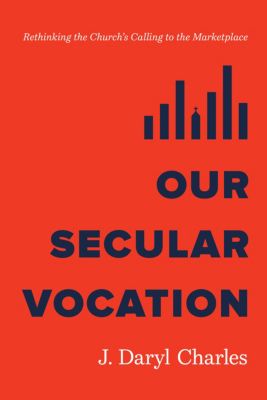
The fact that so many believe the church is silent or indifferent toward work and the marketplace should drive pastors to their knees.
J. Daryl Charles
“I believe the church has largely failed Christians who struggle daily to live out their faith commitments in their places of employment.” So protests one business consultant, who finds the church’s teaching, preaching, and equipping “oddly indifferent” to the fact that 99% of those comprising every congregation—regardless of its size—have vocational callings to the marketplace.
Our churches, he laments, are doing “little or nothing” to equip believers for the workplace. By all appearances, the false dichotomy of “sacred-versus secular” continues to govern the thinking of much of the body of Christ. An unbiblical split-thinking governs the teaching and preaching that goes forth from the church’s pulpits.
This businessman’s complaint finds confirmation in numerous ways, including recent survey data. In the edited volume Calling All Years Good, one author observes in agreement: “Religious education, sermons, and sacraments or other celebrations seldom address vocation or foster vocational conversation, especially across the lifespan.” My own experience in congregational life and in seminary confirms the claims that the church, and the church’s leadership, is largely silent about work, vocation, and the marketplace—the sphere to which virtually all of us are called.
Workplace and calling
This pastoral reality stands in stark contrast to wider empirical research over the last 40 years, suggesting experiencing purpose or meaning in the workplace due to a sense of calling, regardless of its type or social context, substantially contributes to people’s health and well-being. The businessman’s lament regarding the church’s strange “silence” and “indifference” toward work and the marketplace should drive pastors and church leaders to their knees.
In the earliest church, there were no clergy; all were laity. Christ’s disciples functioned in the marketplace rather than being called away from it. Even the basic call of Christ to become “fishers of men” did not call people away from their vocation. Fishermen still fished in the Sea of Galilee. And we can be assured none of the earliest disciples left their nets for some fantasy called “full-time Christian ministry,” even when their lives were initially disoriented and turned upside down.
The church in the marketplace
Three generations ago, novelist Dorothy Sayers, perhaps best known for her detective stories, offered something akin to the businessman’s complaint. In addressing the subject of work, she said:
In nothing has the church so lost her hold on reality as in her failure to understand and respect the secular vocation. She has allowed work and religion to become separate departments, and is astonished to find that, as a result, the secular work of the world is turned to purely selfish and destructive ends, and that the greater part of the world’s intelligent workers have become irreligious, or at least, uninterested in religion.
Several generations later, Sayers’ rebuke remains every bit—if not more—relevant today as the church navigates its way in the 21st century. Indeed, how can anyone take Christianity seriously, particularly in a post-Christian era, if the church has little vision for that domain in which all people—not just Christians—spend most of their lives? Notwithstanding our evangelical concern for “missions” (traditionally understood), where is our burden for the main mission to which God has called 99% of the church, namely, a calling Monday through Friday to the marketplace? It is there the church’s witness—its social presence, testimony, bona fides—will be validated.
The false dichotomy
The false dichotomy of the “sacred” versus “secular” has ancient roots. But the Creator of the universe was incarnated not as a priest, monk, or “contemplative” but as a woodworker and craftsman. What’s more, the “apostle to the Gentiles” worked as a tradesman.
“The Creator of the universe was incarnated not as a priest, monk, or ‘contemplative’ but as a woodworker and craftsman. The ‘apostle to the Gentiles’ worked as a tradesman.” — J. Daryl Charles Click To TweetOne of the revolutionary aspects of the Protestant Reformation was Luther’s and Calvin’s emphasis on vocation. Based on a sturdy doctrine of creation, by which it is understood Christians steward the created order, the reformers emphasized the “sacred” character of the “secular” domain—from ruling and governing to farming to trade and craftsmanship to raising children. Butchers, bakers, and candlestick-makers, as Luther regularly affirmed, all had callings (“vocations”) that were every bit as high and noble as that of priests, monks, and nuns. The difference, however, was noteworthy. The reformers reminded the church her “calling” was to and not away from the world. The reformers were firmly convinced—and properly so—the church is responsible for the world. It cannot leaven the world by shunning the marketplace or having an inferior view of work.
The problem of vision
Our problem, then, is one of vision. How do we view our mission? And how will the Christian church serve as a witness to the culture of which it is a part and to which God has called it? Vision, alas, is the product of good theology. Therefore, our theological vision will need adjustment, in order for pastors and church leaders to equip their congregations in ways that are both faithful to divine revelation and culturally meaningful.
We will need—once again in the spirit of the reformers—to rediscover a “theology of work and vocation,” which itself must be anchored in a sturdy theology of creation. Constitutive elements in this “rebuilding” program include the following: rethinking missions, resurrection, incarnation, stewardship, and the value of work and offering vocational guidance that will help the Christian disciple as he or she navigates the workplace in a satisfying and meaningful way.
Rethinking missions
As we have already intimated, missions as traditionally understood consists not merely—or even chiefly—in “evangelism” (again, traditionally understood). Our witness to the world is active, social, and work-related. Through our love and our deeds, not our words, will the world be convinced of Christ’s lordship. Missions, properly conceived, originates not at the Christian advent but at creation, as the opening chapters of Genesis make clear. Our mission is the marketplace; it is where we steward God’s world.
Rethinking resurrection
Resurrection, as a biblical concept, concerns not merely a transformation but a transformed continuation of what is done on earth. Christ’s own life mirrors this reality. In the eschaton, we will have resurrected bodies; we will not be mere spirit beings. Redemption of all of life will occur. That which has been created will not simply vanish; it will be transformed. After all, as our Lord Himself prayed to the Father, “your will be done on earth as it is in heaven” (Matthew 6:10, emphasis added). As opposed to what some have called a “lifeboat theology” (according to which we should be re-arranging chairs on a sinking ship), the church should be advocating the redemption of all things.
“As opposed to what some have called a ‘lifeboat theology’ (according to which we should be re-arranging chairs on a sinking ship), the church should be advocating the redemption of all things.” — J. Daryl Charles Click To TweetRethinking incarnation
The doctrine of incarnation finds its fullness in our Lord’s life and work on earth. God the Creator took on human flesh (John 1:1-5, 14). In Him, creation and redemption are united, and neither is negated. For this reason, the church carries on God’s redemptive work on earth, including both non-material and material reality. There is value in what is natural, human, and material. Both the heavens and the earth are destined not for some eternal ash heap but rather for transformation, which suggests continuation.
The doctrine of incarnation lies at the heart of the church’s cultural mandate, as each successive generation of Christians wrestles with how to translate Christian conviction in meaningful ways. In this challenge, Paul’s “philosophy of ministry” should inspire and inform us all. Paul said that even though he was free before all people, he made himself a servant to all, in order to persuade some. To the Jews, he became as a Jew in order to persuade Jews. And to those who were outside the [Jewish] law, he became the same, in order to persuade those outside the law. … He became all things to all people, in order that by all means he might persuade some (1 Corinthians 9:19-23).
Anyone who has lived for an extended period of time in a foreign culture can appreciate what the apostle is saying. At the least, Paul is insisting culture matters and that a demonstration of this cultural conviction is the heart of Christian witness. Incarnation, as it turns out, is at the heart of stewardship.
Rethinking stewardship and the value of work
Because many evangelically-minded Christians suffer from an inferior view of work and works, a great many believers need liberation and transformation in terms of their perception of Monday through Friday. We see James’s emphasis squares with Jesus’s teachings, which fused faith and works. Authentic faith will be validated by its works, and stewardship of what God has given each believer will be measured by how we have stewarded our allotted gifts and responsibilities in managing all created things.
“A great many believers need liberation and transformation in terms of their perception of Monday through Friday.” — J. Daryl Charles Click To TweetVocational guidance
The matter of how God speaks to us and guides us in our daily lives is the subject of best-selling books and endless televangelist teaching and preaching. Sadly, much of this teaching is wrong-headed, if not heretical.
Those who function in pastoral and teaching positions in the church require much wisdom, as they consider how to guide their congregants in terms of lifestyle decision-making, work, and the marketplace. Part of their responsibility is to guide their congregants into a mindset and lifestyle of quiet and stillness—and this amidst a cultural environment daily filled with noise, bombast, and competing voices. Only in a cultivated mode of “stillness” can Christians truly “be still and know” the Lord is God (Psalm 46:10, NIV).
In contrast to the common expectation that God will speak with an audible voice, the wisdom of God counsels us to assume “soft whispers” are normative (1 Kings 19:11-12). Virtue, wisdom, and communing with God are the means of spiritual and vocational discernment, not the laying out of fleeces or the spectacular.
In addition, God’s leading and guidance will always factor in those gifts, talents, and inclinations He has given each person, which is why the role and counsel of parents are so strategic in a person’s personal growth from the earliest stages.
The discernment that grows out of wisdom while acknowledging God’s gifts to each person, will also counsel us in those seasons in which seeming “detours” confront us. Moreover, living in the context of Christian community also assists us in vocation-related decisions as we progress in the Christian life, irrespective of the season.
For permission to republish this article, contact Marissa Postell Sullivan.
J. Daryl Charles
Daryl is the author of several books on faith and work, including, most recently, Our Secular Vocation: Rethinking the Church’s Calling to the Marketplace (B&H Academic, 2023).










